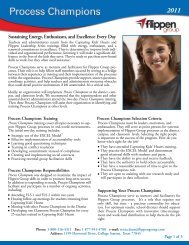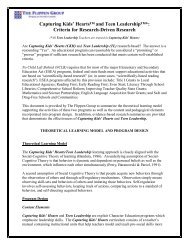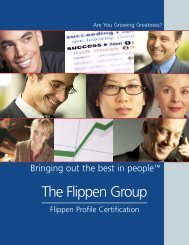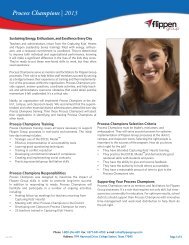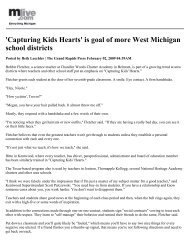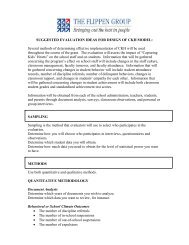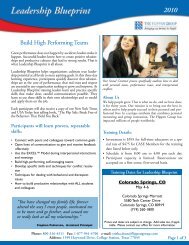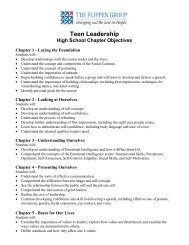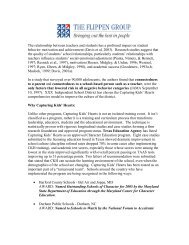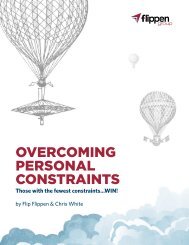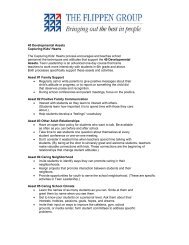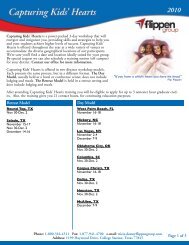Smart & Good High Schools - The Flippen Group
Smart & Good High Schools - The Flippen Group
Smart & Good High Schools - The Flippen Group
- No tags were found...
Create successful ePaper yourself
Turn your PDF publications into a flip-book with our unique Google optimized e-Paper software.
CHAPTER 5: Fostering the 8 Strengths of Character—Outcome 4quences: If it’s true that morality is just a matter of personalopinion—and not a matter of universal obligation—then who’s to say that you or I shouldn’t lie, cheat, steal,blow up innocent people, or do anything else we mighthave a mind to do?According to Christina Hoff Sommers, editor of Vice &Virtue in Everyday Life 9 and a former professor of ethics atClark University, many students come to college “dogmaticallycommitted to a moral relativism that offers them nogrounds to think” about cheating, stealing, and othermoral issues. 10 We interviewed high school teachers whosaid they also saw among their students a trend towardgreater moral relativism, showing up as an increasedreluctance to make moral judgments. A history teachercommented:Students used to be more willing to say, “It’s not okay forkids to be doing X, Y, or Z,” whether the issue was usingdrugs, getting drunk, or being violent. Now they seem to beadrift about what’s moral. <strong>The</strong>y’re willing to say, “Personally,I don’t think that’s right”—to talk about what they woulddo—but they are less and less willing to make a moraljudgment, to impose any kind of standard.Why this apparent increase in the reluctance to makemoral judgments? Some observers cite the influence ofmulticulturalism and the idea that we should not criticizethe views or values of other groups or cultures. Otherscite a cultural emphasis on tolerance that tends to inhibitpeople from holding others accountable to high moralstandards. One school head commented:About a decade ago, a speaker stunned an audience ofschool leaders when he bluntly stated, “It is unfortunatethat the supreme virtue of our age is tolerance.” He wenton to say that tolerance is an essential part of anyone’scharacter, but that it is inadequate as a supreme virtuebecause it is a passive virtue. It doesn’t demand that wehave a commitment to moral and intellectual excellence.<strong>The</strong> most politically correct advice ofour age is, be tolerant. Implicit in thistoleration, however, is often a moral relativismthat asserts we need to tolerateevery viewpoint as the equal of everyother.—F. WASHINGTON JARVISWhatever the sources of non-judgmental relativism, it’s aproblem for any school that wants to be an ethical learningcommunity and hopes to foster the kind of ethicalthinking that leads to ethical action. Students who adopta relativistic stance may consider themselves “off thehook” when it comes to both personal responsibility andcollective responsibility (being their brothers’ and sisters’keeper). If there is no real right or wrong, why shouldthey have moral scruples about what they do, and who arethey to “judge“ others’ behavior, much less intervenewhen someone cheats, bullies, spreads rumors, sexuallyharasses or exploits another person, or engages in behaviorharmful to themselves?Studying VirtueRather than engaging students in an abstract philosophicaldebate about relativism—often an unsuccessful strategy—wecan involve them in what is ultimately likely to bea more fruitful project: studying virtue (“What does goodcharacter look like?”) and reflecting on their own characterdevelopment. Christina Hoff Sommers has found thisapproach effective with her college students. She writes:An exposure to what Aristotle says about courage, generosity,temperance, and other virtues makes an immediateinroad on dogmatic relativism . . . Once a student becomesengaged with the problem of what kind of person to be,and how to become that kind of person, the problems ofethics become concrete and practical. For many a student,morality itself is thereafter looked on as a natural and eveninescapable personal undertaking. I have not come acrossstudents who have taken a course in the philosophy ofvirtue saying that they have learned there is no such thingas morality. 11<strong>The</strong> curriculum carries ourmoral heritage.At the high school level, perhaps the most compelling wayto study virtue is to encounter it in the flesh-and-bloodlives of real people. <strong>The</strong> academic curriculum is full ofopportunities to examine lives of character. In their book,Building Character in <strong>Schools</strong>, Kevin Ryan and Karen Bohlinargue that the curriculum carries our moral heritage.<strong>The</strong> curriculum is a primary source of our shared moral wisdom.Stories, biographies, historical events, and humanreflections provide us with a guide to what it means to leada good life and possess strong moral character. This moralheritage also includes encounters with human failure,132<strong>Smart</strong> & <strong>Good</strong> <strong>High</strong> <strong>Schools</strong>



